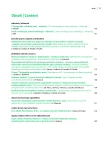-
Medical journals
- Career
Effectiveness of education in diabetes care management – instructions for educators
Authors: Jarmila Jirkovská
Authors‘ workplace: Diabetologické centrum Interní kliniky 1. LF UK a ÚVN – VFN Praha
Published in: Vnitř Lék 2017; 63(3): 171-174
Category: Reviews
Overview
Continuous process of diabetic patient´s education is essential. Educator´s task is to select situationally and individually appropriate form of education and educational tools. Than he becomes capable to motivate patients to participate actively and cooperate. Use of practical and visual educational tools increases the memorability. Studies have shown positive effect on improvement of glycemic control for both individual and group education. When properly educated diabetic patient is able to make independent decisions and manage the disease. Achieving good long-term glycemic control with reduced risk of chronic complications in compliant diabetic patient is the expected target of treatment. Thus the medical care becomes cost-effective.
Key words:
conversation map tools – diabetes mellitus – educator – group education – individual education
Sources
1. Národní zdravotnický informační systém – ambulantní péče: Zdravotnictví ČR: Stručný přehled činnosti oboru: diabetologie a endokrinologie za období 2007–2015. NZIS REPORT č. K/1 (09/2016). Dostupné z WWW: <http://www.uzis.cz/publikace/zdravotnictvi-cr-strucny-prehled-cinnosti-oboru-diabetologie-endokrinologie-za-obdobi-2007–2015>.
2. Jirkovská A et al. Jak (si) kontrolovat a zvládat diabetes. Manuál pro edukaci diabetiků. Mladá fronta: 2014. ISBN 978–80–204–3246–9.
3. Doporučení k edukaci diabetika – aktualizace 2012. Doporučení České diabetologické společnosti. Dostupné z WWW: http://www.diab.cz/dokumenty/Standard_edukace_diabetika_2012.pdf. [14.11.2016].
4. Knowles MS. The Adult Learner: A Neglected Species (Building Blocks of Human Potential). Gulf Publishing Co: Houston 1990. ISBN 978–0872010741.
5. American Diabetes Association. Foundations of care and comprehensive medical evaluation. Sec. 3. In Standards of Medical Care in Diabetes – 2016. Diabetes Care 2016; 39(Suppl 1): S23-S35. Dostupné z DOI: <https://doi.org/10.2337/dc16-S006>
6. Škrha J, Pelikánová T, Kvapil M et al. Doporučený postup péče o diabetes mellitus 2. typu – revize ze dne 1.1.2016. Doporučení České diabetologické společnosti. Dostupné z WWW: http://www.diab.cz/dokumenty/standard_lecba_dm_typ_II.pdf [14.11.2016].
7. Davies MJ, Heller S, Skinner T C et al. Effectiveness of the diabetes education and self management for ongoing and newly diagnosed (DESMOND) programme for people with newly diagnosed type 2 diabetes: cluster randomised controlled trial. BMJ 2008; 336(7642): 491–495. Dostupné z DOI: <http://dx.doi.org/10.1136/bmj.39474.922025.BE>.
8. Venháčová J. Specifika diabetické edukace u dětí. Vnitř Lék 2012; 58(4): 309–312.
9. Eichhorst B, Raia R. Metaanalysis of the glycemic outcomes with the use of the Conversation Map tools to deliver diabetes self-management education and support (DSME/S). Dostupné z WWW: http://healthyinteractions.com/meta-analysis-of-the-glycemic-outcomes-with-the-use-of-the-conversation-map. [14.11.2016].
Labels
Diabetology Endocrinology Internal medicine
Article was published inInternal Medicine

2017 Issue 3-
All articles in this issue
- Effectiveness of education in diabetes care management – instructions for educators
- Irregular breathing during the cardiopulmonary exercise test – from mildly irregular breathing pattern to periodic breathing of oscillatory ventilation type
- Contribution of CT colonography to clinical practice
- Type 2 diabetes mellitus and chronic kidney disease
-
Význam zobrazení srdce pomocí magnetické rezonance v diagnostice hypertrofické kardiomyopatie
Část I - Cardiovascular complications of cancers and anti-cancer therapy
- Comments on current guidelines of type 2 diabetes mellitus treatment
- Radiofrequency catheter ablation of atrial fibrillation performed under general anesthesia: results of a unicentric randomized trial
- Internal Medicine
- Journal archive
- Current issue
- Online only
- About the journal
Most read in this issue- Contribution of CT colonography to clinical practice
- Effectiveness of education in diabetes care management – instructions for educators
- Radiofrequency catheter ablation of atrial fibrillation performed under general anesthesia: results of a unicentric randomized trial
- Irregular breathing during the cardiopulmonary exercise test – from mildly irregular breathing pattern to periodic breathing of oscillatory ventilation type
Login#ADS_BOTTOM_SCRIPTS#Forgotten passwordEnter the email address that you registered with. We will send you instructions on how to set a new password.
- Career

